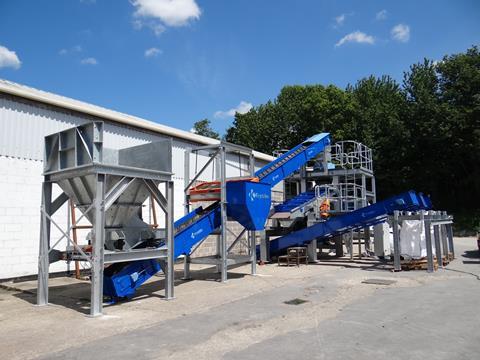
Next in our Finalist Interview series for the Sustainability Awards is Krysteline Technologies with its range of glass recycling strategies. We spoke to the company about this entry, nominated in the commercialized Best Practice category.
You’re a finalist in the Sustainability Awards 2023. Congratulations! To start off, could you summarise your entry, in less than 50 words?
Krysteline Technologies provides glass processing systems and strategies around the world, ensuring all types of glass (including containers, flat glass, laminated windscreens, pharmaceutical borosilicate, and photovoltaic cells) no matter its location, size, or quality is then converted into ultra-low CO2 products across multiple markets including Remelt.
Why do you think the judges were impressed with your entry? Tell us about what is innovative about your project and/or about its impact on packaging sustainability.
As a solution provider, Krysteline looks at the bigger picture. Our innovative technology uses 35% of the energy of its nearest competitor, saving up to 250kg of CO2 for every tonne of recycled glass. More than 50,000 tonnes of aluminium and 100,000 of PVB [Polyvinyl butyral] and other plastics have been diverted from landfill, as the Krysteline Implosion technology only targets the glass whilst exerting a limited effect on associated materials, allowing the other materials’ efficient separation for onward recycling.
Krysteline’s strategy is to develop partnerships and collaborations to formulate solutions for the processing of all types of waste glass. We diligently consider the feedstock available and deliver technology to meet our clients’ expectations, providing them with the means to produce high quality end products that service the demand of traditional marketplaces whilst also assisting in the development of new marketplaces (for example, water filtration, foam glass, fertilisers, and cement).
Our low carbon technology is designed specifically for glass processing, utilising high-quality, wear-resistant materials. This means our solutions not only save carbon costs but also help our partners save money by reducing their energy bills and the regularity with which replacement parts might be required.
This unique and patented Implosion technology is used globally to recover glass from a comingled waste stream which would otherwise typically be destined for landfill. This ensures that our customers can recycle 100% of waste glass by extracting, processing and preparing the glass for future use.
How has your innovation/initiative been received?
Krysteline has sold over 3000 machines globally, estimated to have recovered more than 3 million tonnes of glass and saving 1 million tonnes of CO2. Diverting previously landfilled material into alternative products reduced mineral extraction, virtually eliminated the heavily polluting copper slag as an expendable abrasive and saved countless lives previously lost to silicosis through using amorphous silicate (glass) rather than silica sand. Using glass-based cement saves 4 tonnes of CO2 for every tonne of displaced traditional cement. More than 50,000 tonnes of aluminium and 100,000 of PVB and other plastics has been diverted from landfill.
Where Krysteline’s technology is installed in remote communities or islands the technology offers sustainable and interesting employment for technical, administrative, and scientific persons, creates a resource to be used locally and reduces both the financial and environmental costs of exporting or transporting the waste elsewhere to be processed.
Krysteline Technologies has a significant track record in R&D [research and development] based on issues faced by the industry, developing new processes and products which are low CO2 and suitable for many uses. Krysteline’s current R&D projects include developing a method to extract liquid silicate from waste Photovoltaic glass (solar panels) as well as recovering the PVB, aluminium, copper and gold (which were all previously lost to landfill) and the development of a pharmaceutical glass deconstruction machine to offer a safe and bio-secure disposal and recovery process.
You’re shortlisted for the Best Practice category. What do you see as the key demands and challenges in relation to driving sustainability impacts at scale?
Lack of investment has always been a challenge for a sustainable growth strategy at scale, relying on applying for grants, R&D tax credits, or other sources of funding.
At Krysteline our investment objectives include building an at scale demonstration facility to showcase our technology and offer full scale testing of a clients’ products. This facility would also incorporate a glass sciences laboratory, driving our research and development forward into the use of glass in non-traditional markets.
Another challenge is breaking down barriers in the knowledge and understanding of glass recycling and associated CO2. Our CEO Steve Whettingsteel has travelled the world presenting the challenges faced by the glass industry and excelled in educating the industry, governments, and the public as to how R&D, science, technology, and economics is vital in establishing a robust glass recycling strategy, thinking differently about glass and maximising its potential.
Krysteline Technologies also work with multiple universities around the world to challenge the brightest minds to innovate and bridge academia, industry and investment through presentations, workshops and government supported green initiatives.
The winners of the Sustainability Awards 2023 will be announced at the Sustainable Packaging Summit, which takes place in Amsterdam on 14-15 November. The Summit mobilizes leaders of the FMCG value chain, policymakers, NGOs, recyclers and investors to collaborate, remove barriers and identify opportunities on the road to sustainable transformation.
To learn more or register, visit https://www.packagingsummit.earth/amsterdam2023/.
If you liked this article, you might also enjoy:
The L’Oréal approach to packaging sustainability
What steps is Apple taking to make its packaging more sustainable?
How did Brazil achieve its 100% aluminium can recycling rate – and can it be replicated in the EU?
Experts have their say on the EU’s Packaging and Packaging Waste Directive revisions













No comments yet